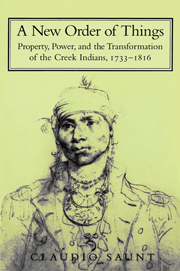Book contents
- Frontmatter
- Contents
- Illustrations and maps
- Abbreviations
- Acknowledgments
- Introduction
- PART I POWER AND PROPERTY BEFORE THE NEW ORDER, 1733–1783
- PART II THE NEW ORDER EMERGES, 1784–1796
- 3 Alexander McGillivray: Mestizo yet Indian
- 4 Forging a social compact
- 5 Blacks in Creek country
- PART III THE “PLAN OF CIVILIZATION,” 1797–1811
- PART IV THE NEW ORDER CHALLENGED, 1812–1816
- Index
3 - Alexander McGillivray: Mestizo yet Indian
Published online by Cambridge University Press: 25 July 2009
- Frontmatter
- Contents
- Illustrations and maps
- Abbreviations
- Acknowledgments
- Introduction
- PART I POWER AND PROPERTY BEFORE THE NEW ORDER, 1733–1783
- PART II THE NEW ORDER EMERGES, 1784–1796
- 3 Alexander McGillivray: Mestizo yet Indian
- 4 Forging a social compact
- 5 Blacks in Creek country
- PART III THE “PLAN OF CIVILIZATION,” 1797–1811
- PART IV THE NEW ORDER CHALLENGED, 1812–1816
- Index
Summary
Alexander McGillivray, the wealthy Scots Indian who promoted himself as the head of the Creeks in the 1780s, has long dominated the recounting of Muskogee history in the decade following the American Revolution. Born in Creek country in 1750, McGillivray spent the first six years of his life among his mother's people and then moved to Augusta to live on the plantation of his father, Lachlan. A year later, he began his education in Charleston under the tutelage of a Scottish relative. By the time Alexander was twelve, his father was one of the largest landholders in the colony, with over 10,000 acres, and was a business partner in a profitable mercantile firm that dealt in slaves, among other commodities. Alexander, perhaps intending to follow in his father's footsteps, apprenticed in two trading companies, one of which was the second largest importer of slaves in Georgia, but the Revolution intervened, forcing Lachlan to retire to Scotland and Alexander to return to his mother's country. Twenty-five years old, literate, and familiar with the intricacies of plantation management and Atlantic commerce, he modeled himself as best he could after the planters he had known in Augusta and Savannah.
In recounting Creek history of the 1780s and early 1790s, most scholars have focused on McGillivray's role as a great diplomat – the “Talleyrand of the Creeks,” as one early historian put it – who ingeniously exploited the rivalry between Spain and the United States in favor of his people.
- Type
- Chapter
- Information
- A New Order of ThingsProperty, Power, and the Transformation of the Creek Indians, 1733–1816, pp. 67 - 89Publisher: Cambridge University PressPrint publication year: 1999



